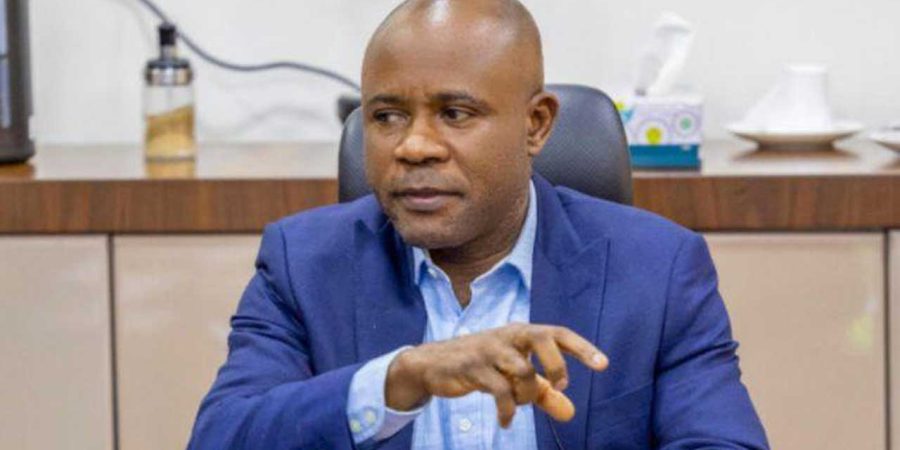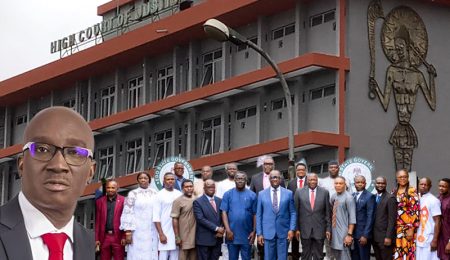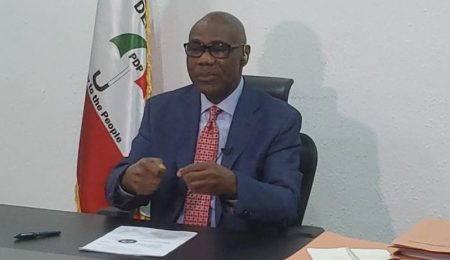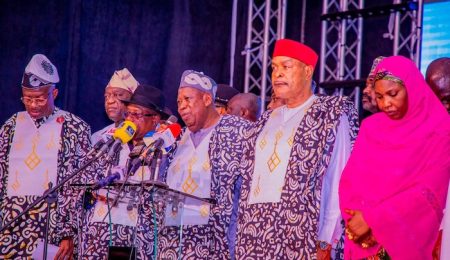The governor of Enugu State, Dr. Peter Mbah, on Tuesday, stated that any nation that must experience genuine economic growth and development must expand its knowledge base and not just focus on increasing its physical assets.
Mbah called for a new dawn of “experiential learning”, in place of the current model, where young people were used to memorising their books.
Speaking at the first Enugu State University of Science and Technology (ESUT) Distinguished Personalities Lecture Series, themed, “Experiential Learning: Building the Wealth of the Nation,” the governor said not much could be achieved under Nigeria’s current education system.
According to the governor, the best nations of the modern world will continue to thrive on their large knowledge base, rather than the magnitude of their assets.
He said throughout history knowledge had always been the prime lever for progress, mentioning the US, China, Germany, and Netherlands, as examples of nations that have invested heavily in qualitative and experiential education.
The governor stated, “The soul and success of any nation relies on its knowledge, not just its assets. All through history, knowledge has always been the prime lever for progress, from the Stone Age to the Industrial Revolution – and it will be no less so as the world gets in the grip of the Fourth Industrial Revolution.”
By embedding the experiential model from the basic to tertiary levels of education, Mbah disclosed that Enugu was creating a seamless pipeline where students progressed from foundational learning to practical innovation.
He directed all Enugu State-owned tertiary institutions to deliver the same model.
According to him, “So, we hereby announce as a policy that all state-owned tertiary institutions in Enugu State must henceforth deliver experiential learning to our children. We want to see this change reflected in planning, budget, curriculum reform, assessment and promotions, as well as research.
“Experiential learning ensures that education is deeply connected to the challenges and opportunities of the real world. It fosters critical thinking, creativity, and collaboration. It empowers students to see themselves not as passive learners, but as active problem-solvers.”
Justifying his administration’s allocation of 33 per cent of the state’s annual budget to the education sector, the governor stated that the most impactful policies were not necessarily those that created the biggest buzz.
He stated, “Nothing transforms lives and paves a path to a promising future like quality education. It is the reason why one-third of Enugu State’s total annual budget went into funding education.
“This translates to roughly twice UNESCO’s recommended benchmark of 15 per cent – 20 per cent. What this means is that for every N100 spent, N33 goes to the education budget.
“This funding has enabled us to implement both infrastructural and pedagogical overhaul of our education system. Our will has enabled us to begin a transition from a system where pupils seemed, to all intents and purposes, to be merely going through the motions of learning, to an ecosystem of experiential learning.”
He said today, the dream of many young people was to emigrate, stressing that the word “japa” has become a major part of the Nigerian reality and is now defining the aspirations of many youths in the country.
Mbah stated, “Why do Nigerian universities seldom feature on the global ranking list of world’s best universities? Why have they seemed perennially unable to become the ideas factory, which universities ought to be?
“The answers to these questions lie in many inconvenient truths, amongst which is the fact that the learning in our schools, from basic to tertiary, has for years not imbued our young people with productive skills and competencies. This is a root cause of our underdevelopment.”
According to him, the present task is to turn Nigeria’s young and populous demography into advantageous human capital. He explained that in Enugu that was already being done.
“Education must be tailored to meet the exigencies of present needs and aspire to solve future challenges. Education is fundamentally, the cornerstone of our progress, the bedrock upon which our future stands,” Mbah maintained.
Stressing that innovation was the fuel of development, he stated that growth was never wished into existence, but thrived in an atmosphere of deep respect for learning and pursuit of knowledge to improve the human condition.
He urged Nigerians to think of experiential learning as the engine that will enable the education system to drive workforce development and productivity.
“We should see it as the missing link between education, industrialisation, and Gross Domestic Product (GDP) growth,” the governor added.
Mbah said Enugu State had been intentional and bold in its commitment to experiential learning and had commenced construction of its pilot Centre for Experiential Learning and Innovation (CELI) at the Enugu State College of Education Technical.
He said, “Developing our human capital has been the highest preoccupation of our present government. The degree to which we meet this task is measurable by our investment in ensuring access to quality education and healthcare.
“As I have often emphasised, nations seldom rise above the standard of their public education. And the wealth of a nation depends upon the health of its people. Both education and health define the quality of the human capital – the truest measure of every nation’s true wealth.”
Through its Basic Education Smart Green Schools, Mhah stated that Enugu had introduced the “cut-off point”, whereby it targeted children from age three, and began to inculcate in them social and health habits as well as fine motor skills, and problem-solving competencies.
The governor disclosed, “After three years of Early Childhood Education, having completed Nursery 1-3, our children complete Basic 1-9. During their 12-year academic study in the Enugu Smart Green Schools, our children learn with interactive digital whiteboards, tablets, and computers; they are immersed in robotics, artificial intelligence, virtual/augmented reality, and Internet of Things.”
He stated that the quality of the Smart Green School compared with the best schools anywhere in the world.
The governor stated, “Upon graduating from the Smart Green Schools, about one-quarter of our children will proceed to Technical and Vocational Schools focusing on key competencies, like Industrial and Information Technology, Building and Fabrication Engineering, as well as Industrial Agriculture, with the objective to become respected and skilled professionals, highly valued for their expertise.
“We have commenced the construction of eight Science, Technical, and Vocational Schools across Enugu State. This includes the Government Technical College (GTC), Enugu. We intend to restore the former glory of this school established in 1948.
“The remainder 75 per cent of graduates from the Smart Green Schools will proceed to Smart Senior Secondary Schools, where they would continue with Experiential Learning, in preparation for Scientific, Arts, and Professional Studies in any of our tertiary institutions.”
Vice Chancellor of ESUT, Professor Aloysius-Michael Okolie; Pro-Chancellor and Chairman of ESUT Governing Council, Sir Chinyeaka Oha; and Chairman of the public lecture, Professor Obiora Ike, commended Mbah for his huge investments in the education sector.
Emmanuel Addeh
Follow us on:



